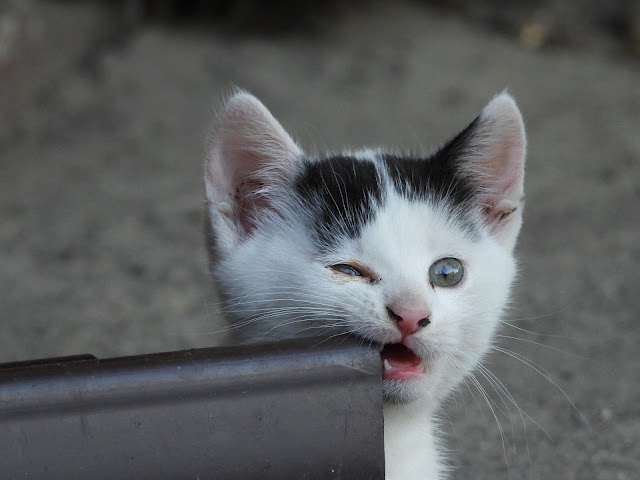Cats frequently scratch and nibble while they're playing and become overexcited. This conduct is normal to little cats and is certainly not an indication of aggression or dread (more often than not), however whenever left uncontrolled, it can turn into a difficult issue. This is particularly evident when your cat's close companion is a small kid.(Newborn Kitten Care)
Luckily, as a rule, it's genuinely simple to prepare cats and deflect this way of behaving. Figure out why your little cat may be inclined to scratching and gnawing and how to determine this social issue.
For what reason Do Kittens Scratch and Bite?
As a rule, cats scratch and nibble in play. This is the manner by which they figure out how to associate with their kin, test limits, and simply have a great time. Once in a while however, scratching and gnawing can be an indication that your cat is scared, furious, or in pain.To be certain this isn't true:
- On the off chance that somebody other than yourself is whining about the little cat's way of behaving, watch to see the communication between that individual and the cat. A few small kids are not yet ready to comprehend that they can hurt a pet and might be unintentionally playing too generally with the cat.
- Try not to contact your little cat's face, paws, and stomach. While certain little cats are OK with being addressed any piece of the body, others are defensive of these touchy spots.
- Look at your little cat delicately by petting everything over. In the event that it reliably answers adversely to a delicate touch in a specific area, there's a decent opportunity it's stinging. Assuming that is the situation, an outing to the vet is all together.
- Be certain that your little cat's way of behaving isn't connected with something that it sees as terrifying. For instance, is it scratching just in specific areas in the home, with specific individuals, or around specific creatures? Assuming that is the situation, you might wish to explore the chance of dread.
- If all else fails of the reason for your little cat's gnawing and scratching, make a meeting with your veterinarian.
Step by step instructions to Stop Scratching and Biting
Whenever cats scratch and nibble, almost certainly, they've been urged to do as such previously. This is particularly normal assuming you or your kids thought the way of behaving was charming when the cat was tiny. You should don't "roughhouse" with your little cat and permits them to chomp or scratch at whatever stage in life. This shows the feline that hands are toys, an illustration that will be more diligently to break later on. Take a stab at subbing feline toys for your fingers while you're playing and save your fingers for delicate petting. Ensure all relatives (and guests) know about these rules so the feline will get a reliable message.
You've checked and are certain your cat's gnawing and scratching is definitely not an indication of any actual issue, you've limited unpleasant lodging with your uncovered hands, however you're actually ending up with cat scratches and nips. Here are a few ways to deal with the issue and preparing your little cat to stop this way of behaving.
Trim the Claws
Paw managing, not at all like declawing, doesn't harm your feline and ought to be done consistently. Try not to utilize scissors; all things being equal, buy a trimmer intended for felines or utilize sharp, human nail trimmers. Your vet can show you the appropriate length and managing strategy.
Holler "Oof"
Say "Oof" boisterously and obviously. While you stand out enough to be noticed, gradually eliminate your hand from its grasp. Try not to yank it away or the little cat will think the play is on, and they will attempt to snatch it in the future. All things considered, delicately haul your hand out of your feline's span.
Give the Kitten a "Break"
You can either pass on the room or take your cat to a little peaceful room and leave it there with the entryway shut. Your cat may simply be overwhelmed and needing some calm recuperation. Open the entryway following 15 minutes. On the off chance that the cat is sleeping, which is much of the time the case, abandon it for some time. Assuming it is conscious, the feline might be requiring some caring consideration. Disregard the play for the present: simply pet your little cat and tell the person in question how cherished it is.
Divert the Kitten's Attention
Frequently perky gnawing of hands or feet happens just in light of the fact that your feline is exhausted, and is searching for a play object. Give your little cat 15 minutes of dynamic play a few times each day with an intuitive toy. Da Bird or other mystery toys are an extraordinary decision. Then again, attempt a laser-pillar type toy that cats can pursue and jump on, or even monetarily accessible "gloves" with extremely lengthy hanging "fingers." Once you've shown both yourself and your feline that hands are not toys, your play meetings ought to be more charming for both of you.
Notwithstanding the dynamic play, a scratching post (or two) are a positive expansion to your home. To the cat, these are currently spots where scratching is empowered. Attempt both even and vertical posts and ones with various surfaces to find the sort your little cat prefers best.
Subsequent stages
In the event that you and your family have stayed predictable and attempted these procedures and your cat is as yet scratching or gnawing, the time has come to talk with a vet or get the assistance of a catlike conduct subject matter expert. These specialists can frequently come to your home, perceive how the circumstance is showing, and proposition substantial tips and answers for your particular feline, circumstance, and way of life.









No comments:
Post a Comment